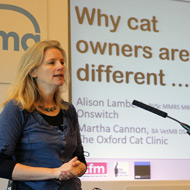The importance of being cat friendly

Martha Cannon
Pet dogs are presented to vets twice as often as pet cats, which not only means cats are getting poorer care, it also means that vets are loosing potential revenue.
Despite figures which show that more than 75 per cent of people view their cat as a member of the family, they are not visiting the vet because the experience can be stressful.
In their lecture at the VPMA/SPVS Congress in Newport, Martha Cannon, from the Oxford Cat Clinic and Alison Lambert from Onswitch explored the many practical ways that the whole practice team can deliver superior care to their cat-owning clients.
Taking a 'cat's-eye' journey from home, to the surgery, and back again, the lecture focussed on simple changes that make a real difference to the cat/owner experience.
Their first key message was that vets should avoid scruffing. "No scruffing, no stress," said Alison. Instead, vets should take their time and take the cat out of the basket slowly - removing the lid if they are able to.
Martha added that vets should then do as much of the consultation as they can within the basket and avoid putting the cat on the consulting room table. If the cat does have to be taken out of the basket, a towel should be placed on the table (so it is not as cold), or the cat should be placed on the owner's lap.
In the waiting room, Martha said that owners and their cats should be given some space. A lot of people forget that it is not just cats who need the space. Many cat owners dislike dogs, and feel uncomfortable being surrounded by them. Bookshelves, screens or benches are all simple but effective ways of creating segregation within your practice and make the world of difference to cat and owner too. In the kennels, provide the cat with a hiding place such as an igloo or even a cardboard box. With this, they'll have somewhere to withdraw to if they are feeling anxious or scared.
Thirdly, Martha said that owners would like vets to recognise how precious their relationship with their cat is. Good manners go along way, and even if you feel silly, talking to the cat and gentle handling can all help to reassure the owner that their cat is in safe hands.
Wrapping up the lecture, Martha said "Cat owners know the difference between 'cat friendly' and 'cat indifference' - so can you afford not to be cat friendly?
For more information about feline friendly nursing care visit: http://www.icatcare.org:8080/vets/guidelines



 The Veterinary Medicines Directorate (VMD) is inviting applications from veterinary students to attend a one-week extramural studies (EMS) placement in July 2026.
The Veterinary Medicines Directorate (VMD) is inviting applications from veterinary students to attend a one-week extramural studies (EMS) placement in July 2026.